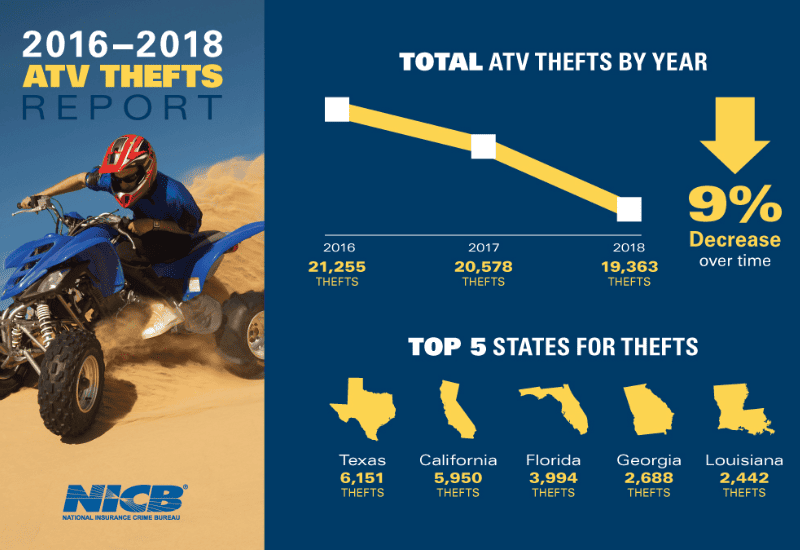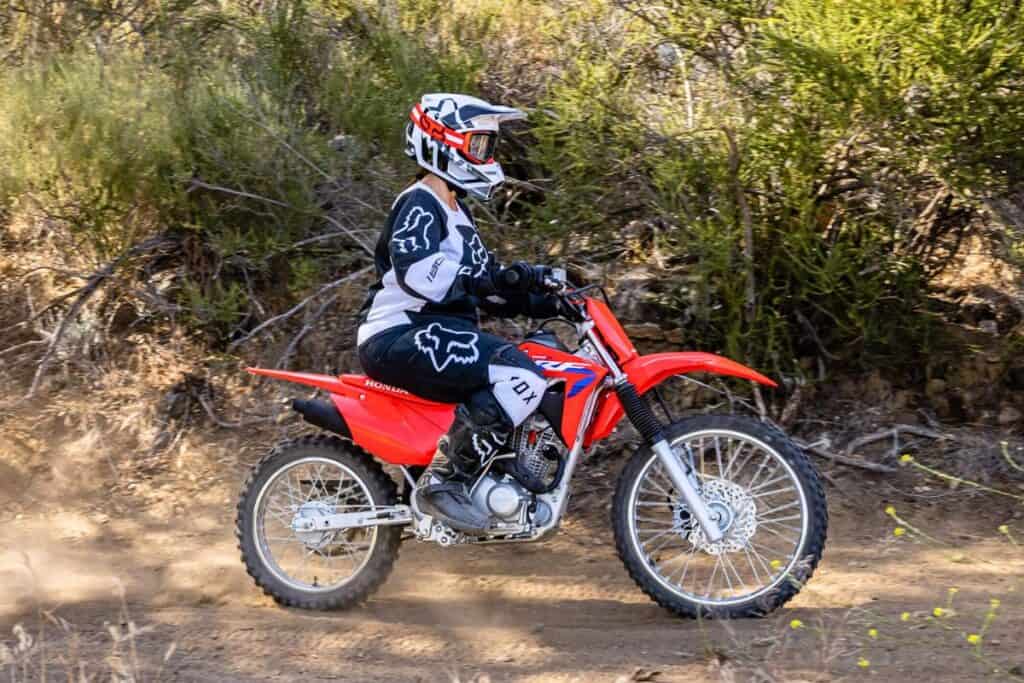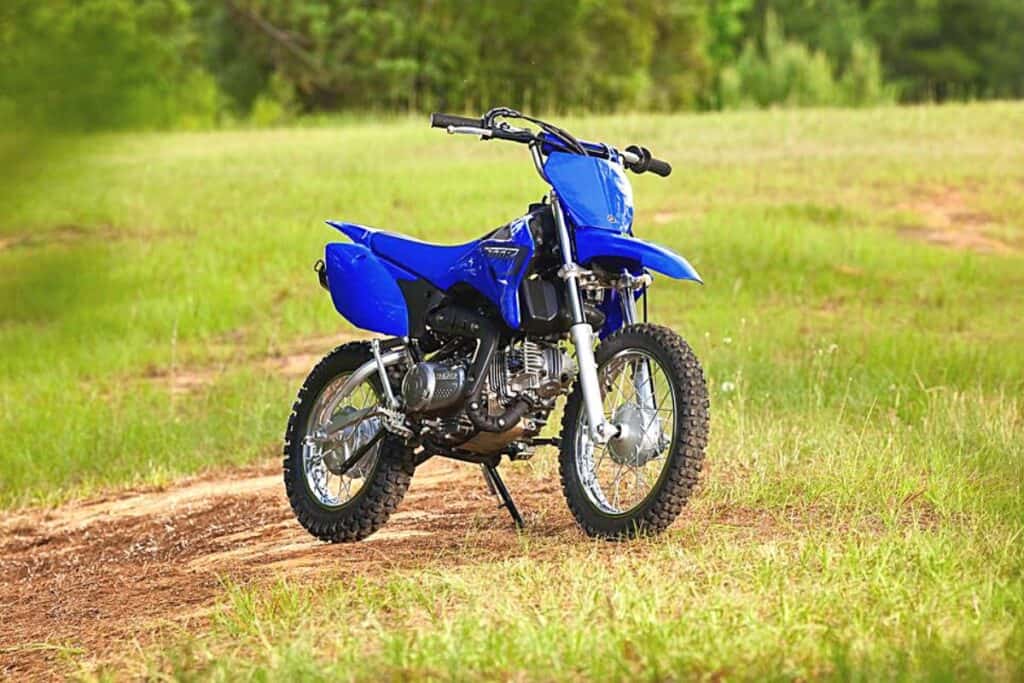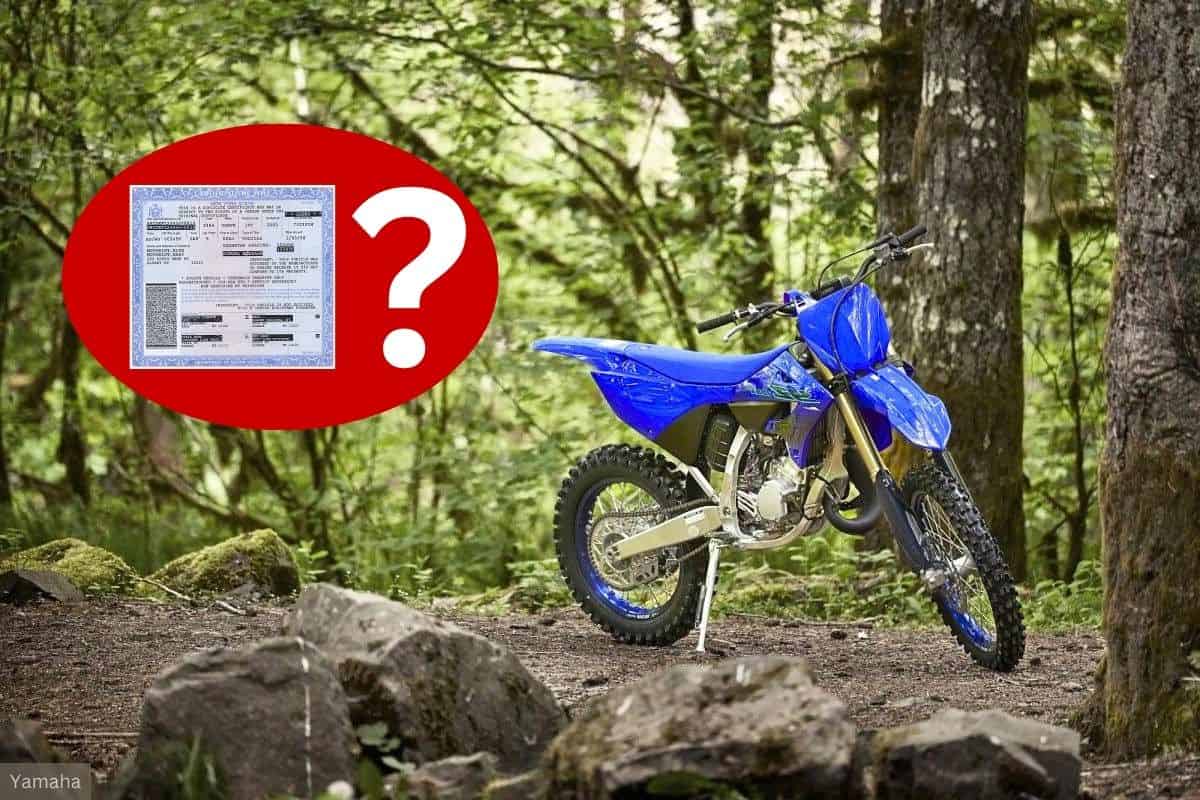If you’re a dirt bike enthusiast, you know the thrill of riding through challenging trails and conquering tough terrain.
However, something you may be less familiar with is the legal aspects of owning and operating a dirt bike.
Which is why many riders ask, “Do dirt bikes have titles?“
Unfortunately, the answer to this question can vary depending on several factors, including state regulations, the age of the dirt bike, and the manufacturer’s design.
So to help clear up the confusion around dirt bike titles, we created this guide to not only answer whether dirt bikes have titles, but also to answer, what the benefits are of titling one, how to title one, and the dangers of buying one without a title.
What are Vehicle Titles?
Before we discuss dirt bike titles any further though, it’s important that we first explain what a vehicle title is.
So that everyone is on the same page.
A vehicle title is a legal document that proves ownership.
It contains essential information about the vehicle, such as the make, model, year, and Vehicle Identification Number (VIN).
The title serves as evidence that you are the rightful owner of the vehicle and is required for various transactions, including selling, purchasing, insuring, and registering the vehicle.
Dirt Bike Titles Explained
A dirt bike title is an official document issued by a state’s Department of Motor Vehicles (DMV) or transportation agency.
It certifies that you are the legal owner of the dirt bike and provides a record of the vehicle’s history.
The title includes details like the owner’s name and address, the dirt bike’s make, model, year, and VIN, as well as any liens or encumbrances on the vehicle.
Difference Between a Title & Registration
While often confused, a title and registration serve different purposes.
A title establishes ownership of the dirt bike, while registration allows you to legally operate the vehicle on public roads or trails.
In many states, you need to have a title before you can register your dirt bike (more on this later).
Registration typically involves paying a fee, providing proof of insurance, and displaying a license plate on your dirt bike.
Do Dirt Bikes Have Titles?

Unfortunately, as mentioned above, the answer to whether dirt bikes have titles is not always straightforward.
This is because, whether a dirt bike has or needs a title depends on several key factors, including the age of the vehicle, the manufacturer’s design, and state regulations.
Factors that Determine if a Dirt Bike Has or Needs a Title
- Age of the dirt bike: Older dirt bikes, particularly those manufactured before a certain year (which varies by state), may not have titles. This is because titling requirements for off-road vehicles were less stringent in the past.
- Manufacturer’s Design: Dirt bikes can be categorized into two main types, including off-road and street-legal. Off-road dirt bikes are designed for use on private property, motocross tracks, and designated off-road trails. These bikes may not have titles, as they are not intended for use on public roads. On the other hand, street-legal dirt bikes or dual sport bikes are equipped with features like turn signals, mirrors, and DOT-approved tires. Making them suitable for both off-road and on-road use. Street-legal dirt bikes generally have titles, as they must be registered and licensed for the road.
- State regulations: One of the biggest factors that determine whether a dirt bike needs to be titled is where the dirt bike is located and where it will be ridden. Titling requirements for dirt bikes vary by state. Some states require all dirt bikes to have titles, regardless of their intended use. While other states may have more lenient regulations for off-road-only vehicles.
Dirt Bike Titling Requirements by State (Listed Alphabetically)

More than three-quarters of all states have enacted some form of ATV, dirt bike, or UTV titling requirements according to state vehicle codes.
- Alabama – May voluntarily register dirt bikes and recreational off-highway vehicles with the Alabama Law Enforcement Agency (ALEA).
- Alaska – Will issue a title only if the owner requests to register it to drive on public roads.
- Arizona – Titles are mandatory for all dirt bikes, whether off-road or on-road street. Even non-highway legal dirt bikes must obtain an Arizona off-highway vehicle title.
- Arkansas – Off-highway vehicles must be registered with the Arkansas Department of Revenue.
- California – Off-highway vehicles do not require regular vehicle registration, but they must display an ID plate or placard issued by the DMV.
- Colorado – Requires an individual to obtain title before selling an off-highway vehicle to a dealer. Obtaining a title is optional for private party to private party sales.
- Connecticut – Must obtain registrations for ATVs owned and operated. Registration is not required if used on property owned or leased by the ATV owner.
- Delaware – Registration of off-highway vehicles is required state-wide.
- Florida – Off-highway and all-terrain vehicles are titled, but not registered, and are not required to be insured with PIP and PDL coverage.
- Georgia – Does not register or title all-terrain vehicles or off-road vehicles.
- Hawaii – Hawaii does not require registration to operate in off-highway areas or public lands. However, non-licensed vehicle use is only allowed on designated trails with a required permit.
- Idaho – If you purchased a dirt bike on or after July 1st, 2006, you must title it. If you purchased it before that date, you are strongly encouraged to title it but are not required to do so.
- Illinois – Certificate of title required through the Secretary of State if purchased after January 1st, 1998.
- Indiana – Off-Road Vehicles (ORVs), which include dirt bikes, purchased after December 31st, 2009 must be titled with the BMV.
- Iowa – All dirt bikes that are registered are required to be titled. If a lien is placed on the dirt bike it must be titled. Once titled, it is always titled.
- Kansas – Dirt bikes must be titled as non-highway vehicles. A dirt bike being sold or traded must be titled in the name of the person selling it.
- Kentucky – All ATVs and dirt bikes are required to be titled.
- Louisiana – Any dirt bike operated upon a parish road or municipal street must be registered with the state, as an off-road vehicle and display a decal issued by the Office of Motor Vehicles.
- Maine – Off-highway vehicle registration is required through the state. Registration is not required for an ATV operated on land that the ATV operator owns or leases.
- Maryland – OHV registration is required and you must display the corresponding decal on your dirt bike.
- Massachusetts – You must register your dirt bike before operating it.
- Michigan – Required to obtain an off-road recreational vehicle certificate of title for ORVs and ATVs through the Secretary of State.
- Minnesota – All-terrain vehicles, including dirt bikes owned by residents, must be registered unless exempt with the DNR.
- Mississippi – ATVs, including dirt bikes, may be voluntarily titled
- Missouri – Recreational off-highway and utility vehicles are not required to be titled or registered.
- Montana – To ride your OHV on public land or trails, it must be registered. A certificate of title is required to license and register your OHV.
- Nebraska – A Certificate of Title is required for all ATVs sold new on or after January 1st, 2004.
- Nevada – All off-highway vehicles greater than 70cc, and 1976 or newer, must be registered and display a registration decal to operate legally.
- New Hampshire – Off-highway recreational vehicles must be registered if operated off the owner’s property.
- New Jersey – ATVs, must be registered to operate on public highways or lands.
- New Mexico – Requires all OHV users to register their OHVs if used on public land.
- New York – ATVs must be registered with the Department of Motor Vehicles if it’s operated anywhere in the state, including the owner’s property.
- North Carolina – Any owner of an all-terrain vehicle may apply for a certificate of title.
- North Dakota – OHVs operated on public land must be registered with the Department of Transportation.
- Ohio – Dirt bikes are only titled for ownership purposes upon the owner’s request. A certificate of title is not required when only being used on private property.
- Oklahoma – Registration is required for ATVs and dirt bikes with the Tax Commission. If used solely for agricultural purposes, you are exempt, however, you can register if you want.
- Oregon – Oregon does not require titling or registering of class I, II, III, or IV ATVs used solely off-highway. However, class II and III ATVs used both off and on regular roads are required to be titled and registered.
- Pennsylvania – All ATVs except those used solely for business or agricultural purposes have to be registered and titled.
- Rhode Island – Every recreational vehicle, except those exempted under Sec. 31-2.2-2, must be registered and numbered.
- South Carolina – Dirt bike titling is optional unless it will be operated on the road.
- South Dakota – Off-road vehicles may not be registered or licensed for highway use but must be titled.
- Tennessee – OHV owners not registering the vehicle for the roads can still have a title issued. If a title has been issued a Department of Revenue sticker must be affixed to the vehicle. Required if operating in state parks or game reserves.
- Texas – Off-highway vehicles (ATVs, dirt bikes) must be titled, but these vehicles are not eligible for registration.
- Utah – Every off-highway vehicle operated or transported in the state must be registered. Off-highway vehicles that are 1988 or newer must also be titled.
- Vermont – Residents must title ATVs.
- Virginia – New ATVs powered by an engine displacing more than 50cc must be titled. Used ATVs can be titled optionally.
- Washington – Must title and register your wheeled all-terrain vehicle (WATV) within 15 days of purchase.
- West Virginia – All ATVs since July 1st, 1989 are required to be titled, but not registered.
- Wisconsin – ATVs are not titled. However, upon transfer of ownership of an ATV that is registered, the seller must give the registration certificate card to the buyer. The buyer then must complete an application for transfer within 10 days.
- Wyoming – Any multipurpose vehicle driven on public roads must be titled, registered, licensed, and insured.
Why Titles are Important for Dirt Bikes & Generally a Good Idea

Titles are important for dirt bikes for several reasons:
- Proof of ownership: A title serves as legal proof that you own the dirt bike. This is especially important when buying or selling a used dirt bike, as it helps ensure that the seller has the right to transfer ownership.
- Helps to Reduce Theft: Having a title for your dirt bike can help reduce the risk of theft. A title serves as an official record of ownership. This makes it more difficult for thieves to sell a stolen dirt bike. Additionally, if your titled dirt bike is stolen, you can provide the title information to law enforcement, increasing the chances of recovering your vehicle.
- Financing and insurance: If you plan to finance your dirt bike purchase or insure your vehicle, most lenders and insurance companies will require you to have a valid title.
- Street-legal conversions: If you want to make your dirt bike street-legal, most states require you to have a title before you can begin the process of converting your off-road motorcycle for on-road use.
- Avoiding legal issues: Riding a dirt bike without a proper title can lead to legal complications, such as fines or even the seizure of your vehicle.
Understanding what a dirt bike title is and why it’s important is the first step in ensuring that your off-road adventures are legal and worry-free.
Not only does a title provide proof of ownership and help you avoid legal issues, but it can also help protect your investment by reducing the risk of theft.
How to Obtain a Title for Your Dirt Bike

If you own a dirt bike without a title or are considering purchasing one, it’s important to understand the process of obtaining a title.
While the steps involved may vary depending on your specific situation and your state’s regulations, in this section, we’ll discuss, generally, how to obtain a title for your dirt bike.
Whether you’re buying a used bike or attempting to title a dirt bike you already own.
Steps to Buying a Dirt Bike with a Title
- Step 1: When shopping for a new or used dirt bike, always ask the seller for the title. Ensure that the title is genuine, matches the dirt bike’s VIN, and has been properly signed over to you. Be cautious of sellers who are unwilling to provide a title or offer excuses for its absence.
- Step 2: Once you’ve purchased a dirt bike with a title, you’ll need to transfer the title to your name. This process typically involves filling out a title transfer form, paying a fee, and submitting the required documents to your state’s DMV or transportation agency. Some states may require additional steps, such as passing a vehicle inspection or providing proof of insurance.
Steps to Obtain a Title for a Dirt Bike without One
- Step 1: If your dirt bike doesn’t have a title, start by locating and verifying the VIN. The VIN is usually stamped on the dirt bike’s frame near the steering head. Cross-reference the VIN with the manufacturer’s records to ensure it matches the make, model, and year of your dirt bike.
- Step 2: In some cases, you may be able to obtain a new title directly from the manufacturer. Contact the manufacturer’s customer service department and provide them with the VIN and any other requested information. They may be able to issue a new title or provide guidance on how to proceed with your state’s DMV.
- Step 3: If you can’t obtain a title through the manufacturer, you may need to apply for a bonded title. A bonded title is a type of title issued when the ownership of a vehicle is uncertain. To obtain a bonded title, you’ll need to purchase a surety bond, which acts as insurance against any future claims on the dirt bike. The bond amount is typically based on the value of the dirt bike. Most states require the lost title bond to be 1.5 or 2 times the vehicle’s value. Once you’ve obtained the bond, you can apply for a bonded title through your state’s DMV.
Each state has its own requirements for obtaining a dirt bike title.
Some states may have a more streamlined process for off-road vehicles, while others may require additional documentation or inspections.
Be sure to reference your state’s specific requirements above and follow their guidelines closely.
Buying a Used Dirt Bike With No Title – Buyer Beware!

When shopping for a used dirt bike, you may come across sellers offering bikes without titles.
While it may be tempting to snag a good deal on a titleless dirt bike, you should proceed with extreme caution.
Because, purchasing a dirt bike without a title can lead to lots of legal, financial, and safety issues down the road that can quickly turn your dream ride into a nightmare.
To illustrate this, take a look at some of the main issues you can run into if you choose to purchase a used dirt bike with no title:
- Potential stolen property: One of the most significant risks of buying a dirt bike without a title is the possibility that the bike is stolen property. Thieves often sell stolen dirt bikes at attractive prices, hoping to quickly offload the hot merchandise. If you unknowingly purchase a stolen dirt bike, you could face legal consequences and lose the bike without compensation if the rightful owner comes forward.
- Difficulty obtaining a title: Even if the dirt bike isn’t stolen, obtaining a title for a bike that doesn’t have one can be a time-consuming and expensive process. You may need to navigate complex bureaucratic procedures, such as applying for a bonded title or tracking down the previous owner for a bill of sale. In some cases, obtaining a title may be impossible, leaving you with a dirt bike you can’t legally ride or sell.
- Hidden mechanical issues: Sellers offering dirt bikes without titles may be trying to conceal the bike’s true condition or history. The lack of a title could indicate that the dirt bike has been in a serious accident, sustained significant damage, or has been rebuilt with substandard parts. Without a title and a clear record of the bike’s history, you may be taking on unknown mechanical issues that can be costly to repair.
- Inability to insure or finance: Most insurance companies and lenders require a valid title to insure or finance the dirt bike. Without a title, you may be unable to obtain the necessary coverage or funding to protect your investment and ride legally.
- Limited resale value: If you decide to sell your dirt bike in the future, not having a title can significantly decrease its resale value. Many potential buyers will be hesitant to purchase a dirt bike without a title due to the associated risks and difficulties in obtaining one.
To avoid these pitfalls, always insist on purchasing a used dirt bike with a valid title.
If a seller is unwilling or unable to provide a title, walk away from the deal.
The short-term savings of buying a titleless dirt bike are rarely worth the long-term headaches and potential legal and financial consequences.
Got More Dirt Bike Title Questions? We’ve Got More Answers…
Recent Posts
In recent years, off-road enthusiasts have been taking their adventures to the next level by installing UTV underglow lights on their side-by-sides. Which adds a unique visual appeal and improves...
Side by sides, also known as UTVs, are used by a wide range of outdoor enthusiasts from off-roaders to farmers to ranchers, and hunters. As these versatile machines offer a unique blend of...

